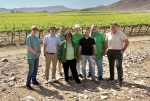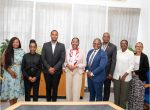Nedbank Namibia this week brought together industry players to discuss the financing prospects, collaboration opportunities, as well as the potential sustainable economic expansion opportunities within Namibia’s green energy and green hydrogen industries.
The event aimed to foster collaborations with regional neighbours, government entities, and the green energy sector to uncover unexpected synergies, particularly in the context of financing renewable energy projects.
With esteemed captains of industry and public officials in attendance, the information sharing event provided a pivotal opportunity to chart Namibia’s path forward amidst the imminent clean energy revolution.
At the event, Nedbank Namibia Managing Director, Martha Murorua, highlighted Namibia’s poised economic growth. ‘Tonight, the sentiment is one of optimism rather than gloom; of growth rather than headwinds; of revival rather than slump,’ Murorua enthused, setting the tone for the evening’s proceedings.
During her address, she reflected on the late President Dr. Hage G. Geingob’s bold stance on renewable energy at the UN Climate Change Conference in Dubai last year, where he expressed his desire to position Namibia as ‘a hub for renewable energy innovation, driving green industrialisation that creates jobs, fosters economic development, and ensures energy access for all.’
Speaking at the event, both the governor of the Hardap as well as the governor of the //Kharas Regions, Honourable Salomon April, and Honourable Aletha Frederick, presented the audience with the opportunities presented by the green hydrogen expansion within their regions.
Hon. Aletha Frederick emphasised the urgent need to address critical issues in //Kharas in order to attract foreign investment, focusing on infrastructure development such as the improving of road networks, water and sanitation systems, access to education, telecommunications, and healthcare facilities.
Hon. Salomon April echoed her sentiment, expressing hope that the green hydrogen revolution could bring jobs to Hardap, a region traditionally reliant on livestock farming but grappling with challenges such as droughts and food insecurity. ‘We hope green hydrogen brings tangible change within our lifetime,’ April noted.
The CEO of the Environmental Investment Fund of Namibia, Benedict Libanda, in his address highlighted the increasing global demand for green hydrogen energy. He outlined significant opportunities for banks and lenders to participate in this burgeoning sector. “Global investment in green hydrogen is projected to reach $500 billion by 2030, and by 2050, the global economy is expected to require 500 million tonnes of hydrogen annually to meet these targets,” said Libanda.
Nedbank Group Managing Executive for Corporate Investment Banking, Anel Bosman, who led the Nedbank South Africa’s CIB team, in her address stressed that addressing climate change has never been more urgent. “The next decade will be a pivotal period that challenges our ability to adapt, especially as Africa is experiencing accelerated warming compared to the global average. This effort goes beyond preserving our environment and ecosystems; it’s about protecting our economies and societies from the profound impacts of climate change.”
Bosman praised Namibia for its significant strides in hydrogen energy, citing the Hyphen Hydrogen Energy project. “This pioneering initiative is expected to create 100,000 domestic jobs and position Namibia as a producer of some of the world’s most affordable green hydrogen, estimated at $2 per kilogramme.”
In his keynote address, Head of Programme for the Namibia Green Hydrogen Programme , James Mnyupe, applauded Nedbank Namibia for contributing funding to the green hydrogen initiative right from the onset. “Nedbank Namibia’s support was there from the beginning—this underscores their leadership and vision,” he remarked.
Mnyupe further emphasised that while the focus often centres on green hydrogen as a molecule, the crucial emphasis in Namibia remains on its people, and highlighted the programme’s goal to uplift the entire region, as Namibia positions itself as a leading exporter of green hydrogen energy.
Reflecting on his collaboration with the late President Hage Geingob, Mnyupe highlighted Geingob’s pan-African perspective on the initiative. He recalled the late president’s initial feedback on earlier drafts of the commission’s plan, emphasising the need for a stronger continental focus to enhance the Southern African Development Community (SADC). “As African nations, our aim should be to build interconnected infrastructure, be it transport hubs, energy networks, or shared export hubs.”
Through collective action, Nedbank Namibia reaffirmed its commitment to supporting initiatives essential for achieving a climate-resilient future aligned with the energy transition.










